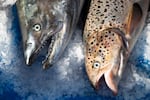
A wild Pacific salmon, left, next to a farm-raised Atlantic salmon at Home Port Seafoods in Bellingham, Washington.
Megan Farmer / KUOW
Atlantic salmon have been entering Pacific waters for decades. Most of them have died of starvation.
But that doesn’t mean they aren’t capable of colonizing the Northwest.
Last summer's escape of more than 100,000 Atlantic salmon from a fish farm in Puget Sound has renewed a debate among scientists about whether or not these fish can survive long term in the Pacific Northwest.
John Volpe, a professor at the University of Victoria, says the odds have never been better for these fugitive fish. That’s because there aren’t as many steelhead to compete with.
"Steelhead … make their living in the freshwater environment in very much the same way as Atlantic salmon do: in the same place, consuming the same things," he explains.
It's a big question now, two months after the summer's fish-farm escape, in part because thousands of salmon are being tracked in waters throughout Puget Sound and beyond.
Most Atlantic salmon don't figure out what to eat in the wild, but, if a couple do, "presumably there is some genetic component to that figuring it out," Volpe says. "When those fish breed, 100 percent of the next generation will have that genetic profile that figured it out."
In most places where Atlantic salmon have been introduced in rivers and streams, they haven't established viable populations; the only place in the world with a confirmed self-sustaining population of introduced Atlantic salmon where there are no native Atlantic salmon is the Kerguelen Islands.
Even if Atlantic salmon don't manage to reproduce, they could still cause problems for native fish if they make their way from saltwater to spawning grounds in rivers and streams.
"Consequences would be ... just physically being in the way, disturbing nests," says Mike Rust, a scientist at the National Oceanic and Atmospheric Administration.
Rust says biologists are checking spawning grounds and will remove any Atlantic salmon they find.
